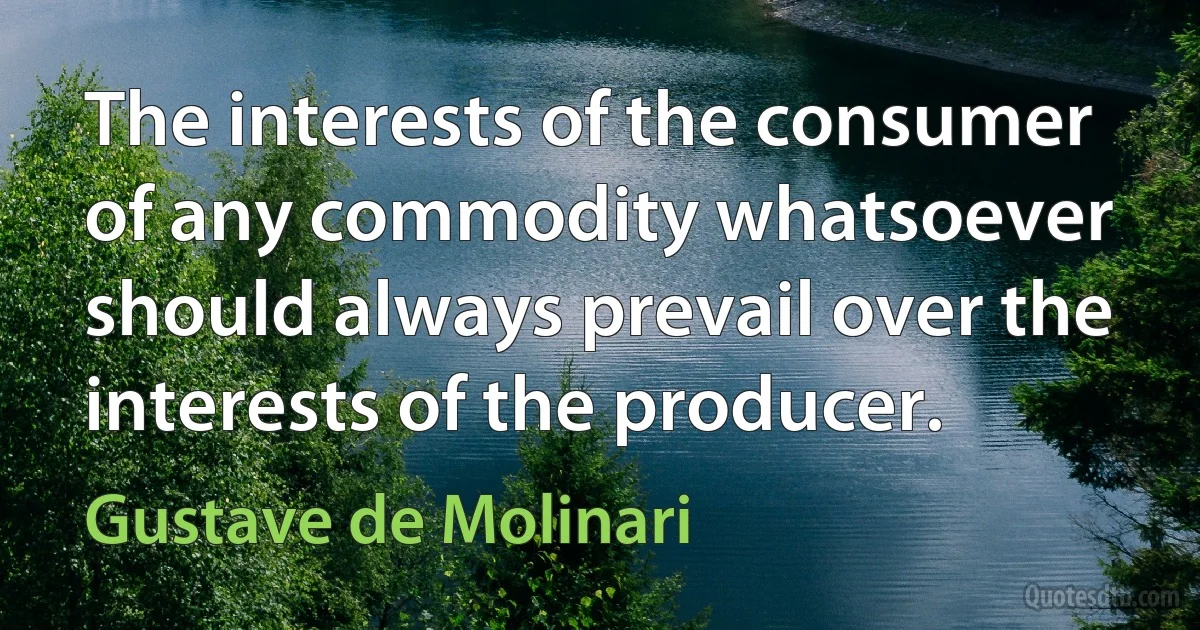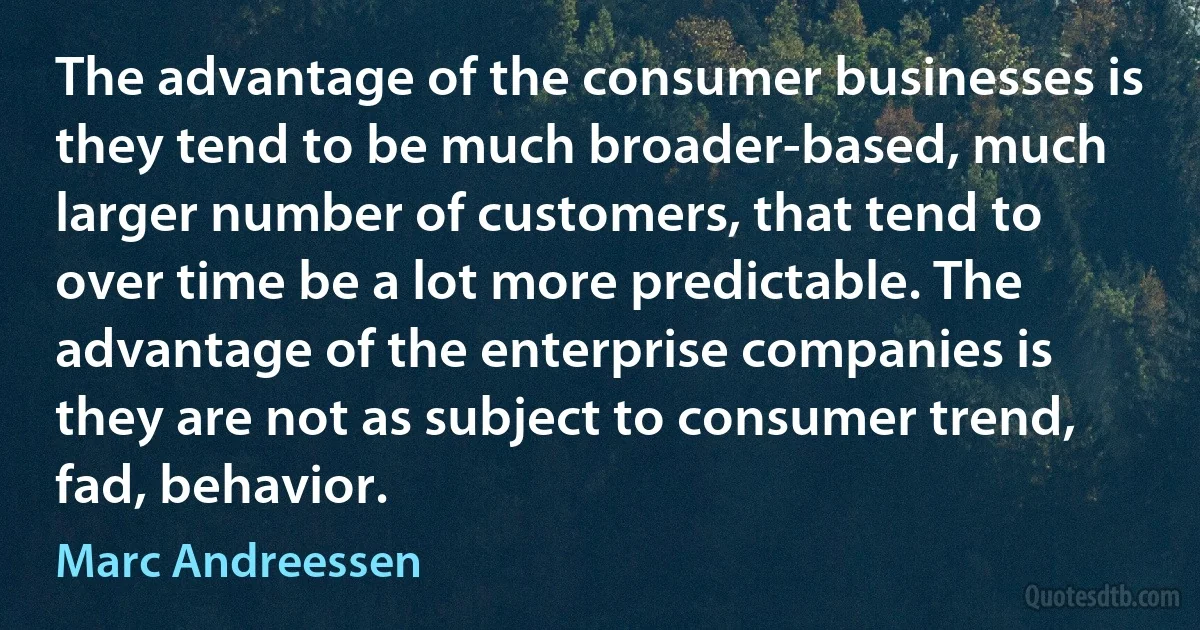Consumer Quotes - page 7
The consumer society is so all-pervasive today that it is easy to assume it has always existed. Yet in reality it is one of the more recent innovations that propelled the West ahead of the Rest. Its most striking characteristic is its seemingly irresistible appeal... The result is one of the greatest paradoxes of modern history: that an economic system designed to offer infinite choice to the individual has ended up homogenizing humanity.

Niall Ferguson
It must always be borne in mind that each and every individual is not only a producer but a consumer. In the final analysis of our conditions, we have to admit that it is not lack of consumption, but lack of production which is our present economic danger. The immigrant is needed, provided this fact is overcome, provided supply-whether in schools, in homes, or in shoes-does not fall behind demand. The public could today consume much more of the necessities of food, shelter and clothing than they are able to procure or have ever been able to procure in a country where the standard of living is so high. If, through cheap labor, and an increased willingness on the part of alien labor to live on the edge of existence, these standards are threatened, then is the time to bring legislative action to bear on the situation.

Calvin Coolidge
Publicity is usually explained and justified as a competitive medium which ultimately benefits the public (the consumer) and the most efficient manufacturers - and thus the national economy. It is closely related to certain ideas about freedom: freedom of choice for the purchaser: freedom of enterprise for the manufacturer. The great hoardings and the publicity neons of the cities of capitalism are the immediate visible sign of "The Free World." For many in Eastern Europe such images in the West sum up what they in the East lack. Publicity, it is thought, offers a free choice.

John Berger
But our openness to the dazzling possibilities presented by modern science must be tempered by some hard-nosed skepticism. Many interesting possibilities simply turn out to be wrong. An openness to new possibilities and a willingness to ask hard questions are both required to advance our knowledge. And the asking of tough questions has an ancillary benefit: political and religious life in America, especially in the last decade and a half, has been marked by an excessive public credulity, an unwillingness to ask difficult questions, which has produced a demonstrable impairment in our national health. Consumer skepticism makes quality products. This may be why governments and churches and school systems do not exhibit unseemly zeal in encouraging critical thought. They know they themselves are vulnerable.

Carl Sagan
This option the consumer retains of being able to buy security wherever he pleases brings about a constant emulation among all the producers, each producer striving to maintain or augment his clientele with the attraction of cheapness or of faster, more complete and better justice.If, on the contrary, the consumer is not free to buy security wherever he pleases, you forthwith see open up a large profession dedicated to arbitrariness and bad management. Justice becomes slow and costly, the police vexatious, individual liberty is no longer respected, the price of security is abusively inflated and inequitably apportioned, according to the power and influence of this or that class of consumers. The protectors engage in bitter struggles to wrest customers from one another. In a word, all the abuses inherent in monopoly or in communism crop up.

Gustave de Molinari
In all cases, for all commodities that serve to provide for the tangible or intangible needs of the consumer, it is in the consumer's best interest that labor and trade remain free, because the freedom of labor and of trade have as their necessary and permanent result the maximum reduction of price.

Gustave de Molinari
But what would become of mass production and its system of financial expansion if technical perfection, durability, social efficiency, and human satisfaction were the guiding aims. The very conditions for current financial success - constantly expanding production and replacement - works against these ends. To ensure the rapid absorption of its immense productivity, megatechnics resorts to a score of different devices: consumer credit, installment buying, multiple packaging, non-functional designs, meretricious novelties, shoddy materials, defective workmanship, built-in fragility, or forced obsolescence through frequent arbitrary changes of fashion. Without constant enticement and inveiglement by advertising, production would slow down and level off to normal replacement demand. Otherwise many products could reach a plateau of efficient design which would call for only minimal changes from year to year.

Lewis Mumford
A worker is protected from his employer by the existence of other employers for who he can go to work. An employer is protected from exploitation by his employees by the existence of other workers whom he can hire. The consumer is protected from exploitation by a given seller by the existence of other sellers from whom he can buy.

Milton Friedman
...the same mistake that disfigured the coverage of the Bosnian war, where every consumer of news was made to understand that there was fighting between Serbs, Croats, and "Muslims." There are two apples and one orange in that basket, as any fool should be able to see. Serbian and Croatian are national differences, which track very closely with the distinction between Eastern Orthodox and Roman Catholic beliefs. Many Muslims are Bosnian, but not all Bosnians are Muslim. And in fact, the Bosnian forces in the late war were those which most repudiated any confessional definition.

Christopher Hitchens
During late Autumn 1956, in connection with a marketing study, I forecast the imminence of a major U. S. economic recession, triggered by the over-stretching of a post-1954 credit-bubble centered in financing of automobiles, housing, and analogous consumer goods. This recession broke out in February 1957 statistics, and was generally, if reluctantly acknowledged to have occurred several months later. The recession-spiral lasted into mid-1958, and was followed by a prolonged stagnation until an upturn appeared under the Kennedy administration.

Lyndon LaRouche
I am a consumer, part of the system of capitalism. To the corporations that control our lives, I am nothing but a huge mouth wearing designer jeans, just one of billions, to be cajoled or threatened with advertising into giving my money to people who already have too much. Although I vocally consider this a despicable state of affairs, I buy their loveless food and wear their manufactured garments. I am simultaneously antagonist and component.

Ben Croshaw
The latter-day outcome of this evolution of an archaic institution, the wife, who was at the outset the drudge and chattel of the man... has become the ceremonial consumer of goods which he produces. But she still quite unmistakably remains his chattel in theory; for the habitual rendering of vicarious leisure and consumption is the abiding mark of the unfree servant.

Thorstein Veblen
Our challenge is to create the kind of economic background which enables private initiative and private enterprise to flourish for the benefit of the consumer, employee, the pensioner, and society as a whole...I believe we should judge people on merit and not on background. I believe the person who is prepared to work hardest should get the greatest rewards and keep them after tax. That we should back the workers and not the shirkers: that it is not only permissible but praiseworthy to want to benefit your own family by your own efforts.

Margaret Thatcher



